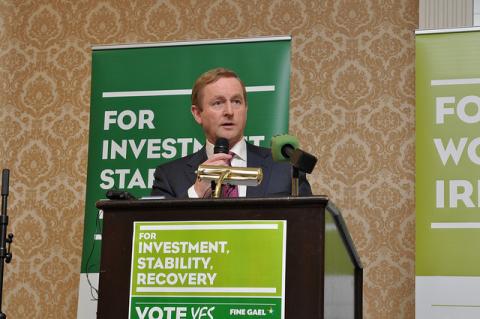Yes and No sides both have a case to make

The main argument for a No vote in the Fiscal Treaty referendum is to call a halt to Europe's march to a neoliberal drumbeat. By Vincent Browne.
Transport minister Leo Varadkar had a point when he said a few weeks ago that referendum campaigns are usually fought over issues that are irrelevant to the point of the referendums.
His colleagues are proving him right on the Fiscal Treaty. So too are the opponents of the treaty.
Were Enda Kenny to ask for my advice, I would tell him that claims that this treaty is about investment, jobs, growth and the stability of the euro are wild exaggerations in part and just wrong in part. The same suspects said similar things about the Lisbon Treaty, and they were all wrong about that. There is a straightforward case for the Fiscal Treaty, which is less commanding but more credible, in part because it is true.
Nobody thought the fiscal rules of the Eurozone needed to be tightened until last November, when Greece went into another meltdown, threatening the whole euro project. There was pressure on Germany then to agree to a sharing of the debt by way of eurobonds or otherwise, but the German electorate is alarmed by such a prospect, believing - correctly - that the burden of such debt will be borne eventually by Germany. We are right to be impatient about German alarm, because they have not acknowledged how the euro project has been of spectacular benefit to Germany.
Low interest rates suited Germany, still struggling with the adjustment of German unification. They did not suit other countries, including Ireland.
But impatience is irrelevant right now, for we need Europe's strongest economy to be part of the rescue of Europe from the financial crisis. If we persuade the Germans to bear the main burden of the rescue, by signing up to rules that largely existed anyway, this is not a high price to pay.
Yes, there are more stringent targets than previously, along with disciplinary procedures and fines, which are annoying. And there is that menacing clause on refusing bailouts to countries that don't sign up. But it isn't such a big deal and, if that is the price to pay for German participation in the rescue package, then let's just grin and bear it.
All the more so since we might well have serious problems in two years' time when, inevitably, we will need a second bailout. If we vote No, that complicates things for us.
So I would advise Kenny to stop the palaver about jobs, investment, growth and stability. The people are more likely to buy this more modest argument than the implausibilities.
But if Gerry Adams or Joe Higgins were to ask my advice, I would reassure them there was also a good argument for voting No. The stuff about austerity forever, about the need for stimulus, "savage cuts", protecting the oligarchs, etc, is just more baloney, however - not because it isn't true, but because it is irrelevant.
We cannot avoid the necessity for Ireland to get control of its debt, and that will mean austerity for some people, come what may. Ideally, the fixing of the debt would be accompanied by a radical redistribution of wealth and income. But the electorate is not going to vote for parties that advocate such a radical adjustment, so it has to be, at best, an amended version of the Government's austerity strategy - but austerity nonetheless, and unfair austerity.
Neither is there an easy avoidance of the point that we will be in serious trouble if we are refused a second bailout in two years' time.
The main argument I think for voting No is to call a halt to Europe's march to the neoliberal drums. These drums ordain that markets rule uber alles, irrespective of the cruelties this imposes on a huge swathe of society, irrespective of the destruction of solidarity this will impose, with more broken communities, more broken lives.
True, the Fiscal Treaty itself does not add significantly to the beat of these drums, but it reinforces the further freeing of markets, "flexibility" of labour markets, which means fewer protections and less security for workers, and more competitiveness, which means lower wages for the lower paid.
All this is in train anyway, via the Maastricht Treaty, the Stability and Growth Pact and the "Six Pack", through all of which we sleepwalked.
But now that we have awakened to appreciate the enormity of this and the enormity of the permanent surrender of sovereignty, with everlasting supervision of our budgets, economic policy and our competitiveness, we need to call a halt. Not just on our own behalf, but on behalf of the peoples of Europe whose governments - in complicity with the EU - have contrived to deny them a direct part in these decisions.
Actually, it won't be a halt - for our voting No won't stop it - but even though all we can do is fire a feeble shot across the bow, it will echo around Europe and, in the turmoil that is surely to come, it may have resonance.
Of course, if that doesn't work, we can always vote again on the treaty... {jathumbnailoff}
